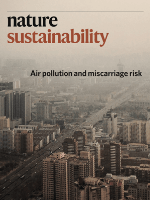
Nature Sustainability
Scope & Guideline
Empowering change for a sustainable future.
Introduction
Aims and Scopes
- Interdisciplinary Research:
The journal promotes research that integrates various disciplines, including environmental science, economics, sociology, and policy-making, to provide holistic solutions to sustainability challenges. - Sustainable Development Goals (SDGs) Focus:
Nature Sustainability emphasizes research that aligns with the United Nations Sustainable Development Goals, addressing issues such as climate change, biodiversity loss, and sustainable resource management. - Innovative Solutions and Technologies:
The journal highlights innovative approaches and technologies that contribute to sustainability, including advancements in green chemistry, renewable energy, and sustainable agriculture. - Socioeconomic Impacts and Equity:
Research exploring the social and economic dimensions of sustainability, including equity, justice, and the impact of environmental policies on vulnerable communities, is a core focus. - Ecosystem Services and Biodiversity:
The journal underscores the importance of ecosystem services and biodiversity in sustainable development, advocating for research that connects ecological health with human well-being.
Trending and Emerging
- Climate Resilience and Adaptation:
Recent publications emphasize the importance of building climate resilience, with a focus on adaptation strategies that communities and ecosystems can implement in response to climate change. - Circular Economy Practices:
There is a growing trend towards research on circular economy principles, highlighting innovative recycling and resource recovery methods that minimize waste and promote sustainability. - Technological Innovations for Sustainability:
Emerging themes include the role of technology in enhancing sustainability, particularly through advancements in renewable energy, battery technologies, and sustainable materials. - Biodiversity Conservation Strategies:
Recent articles increasingly address the urgent need for biodiversity conservation, exploring innovative strategies that integrate conservation into development planning. - Social Equity in Sustainability:
The journal is increasingly focusing on the intersection of sustainability and social equity, with research that examines how environmental policies impact different demographics and promote inclusive practices.
Declining or Waning
- Traditional Agricultural Practices:
There has been a noticeable decline in research focused on conventional agricultural methods, as the journal increasingly prioritizes studies highlighting innovative and sustainable agricultural practices. - Fossil Fuel Dependency:
Research that primarily addresses the fossil fuel industry without a clear connection to sustainable transition strategies is becoming less prevalent, reflecting a shift towards renewable energy solutions. - Single-Dimensional Environmental Policies:
Papers discussing environmental policies in isolation, without considering social and economic implications, are appearing less frequently, indicating a preference for more integrated approaches. - Localized Environmental Issues:
The journal's focus is shifting away from narrowly defined local environmental issues towards broader, systemic analyses that connect local actions to global sustainability goals. - Reactive Environmental Management:
There is a waning emphasis on reactive approaches to environmental management, with more publications advocating for proactive and preventive strategies.
Similar Journals
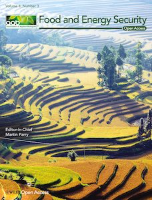
Food and Energy Security
Exploring the Nexus of Agriculture and Energy for a Sustainable TomorrowFood and Energy Security, an esteemed journal published by WILEY, is dedicated to advancing the fields of food science, agriculture, and renewable energy. Since its inception in 2012, this open-access journal has provided a platform for groundbreaking research and innovative practices that address global challenges related to food production and energy sustainability. With an impressive impact factor reflected in its Q1 quartile rankings across notable categories such as Agronomy and Crop Science and Food Science, this journal is instrumental for researchers and practitioners alike who are focused on enhancing food security and promoting sustainable energy solutions. The journal's scope encompasses multidisciplinary approaches and encourages submissions that explore the intersection of food systems and energy dynamics, ensuring relevance in the evolving landscape of environmental science and policy. By offering open access to its publications, Food and Energy Security commits to making vital research accessible, fostering informed dialogue and collaboration among scholars, policymakers, and the agrifood industry worldwide.

Granja-Revista de Ciencias de la Vida
Elevating Scholarly Discourse in Agricultural ResearchGranja-Revista de Ciencias de la Vida, published by the Universidad Politécnica Salesiana Ecuador, is a prominent open access journal that has been disseminating valuable research since 2002. With its ISSN 1390-3799 and E-ISSN 1390-8596, this journal serves as a vital forum for researchers in the fields of Agricultural and Biological Sciences, Biochemistry, Earth Sciences, and Environmental Science. Ranking in the Q3 and Q4 quartiles for various categories according to Scopus, it occupies a significant position within its disciplines, with an HIndex that underscores its scholarly impact. Granja aims to foster interdisciplinary collaboration and innovation by publishing rigorous research articles, reviews, and case studies that address contemporary challenges in life sciences, primarily within the context of Ecuador and Latin America. The journal’s commitment to open access ensures that its findings are readily available to a global audience, enhancing the visibility and application of research for academics, professionals, and policymakers alike.

ENVIRONMENTAL SCIENCE AND POLLUTION RESEARCH
Transforming Environmental Insights into Actionable SolutionsEnvironmental Science and Pollution Research is a premier international journal published by Springer Heidelberg, dedicated to advancing knowledge in the field of environmental science and pollution. With an impressive impact factor reflecting its vital contributions to research, the journal is categorized in the top quartiles (Q1 and Q2) across several domains, including Health, Toxicology and Mutagenesis, and Environmental Chemistry. Established in 1994, it continues to be a critical resource for researchers, professionals, and students focusing on pressing environmental issues. The journal provides an insightful platform for disseminating significant findings related to pollution and its effects on health and the environment, contributing to a better understanding and resolution of these challenges. While it currently does not offer Open Access options, its inclusion in prominent rankings, such as the Scopus rankings, underscores its reputation and influence within the scientific community.

Journal of Environmental Science and Management
Innovating solutions for sustainable management practices.Journal of Environmental Science and Management, published by the University of the Philippines Los Baños College, serves as a vital platform for disseminating research findings and innovations in the field of environmental science and management. With an ISSN of 0119-1144, this journal aims to foster multidisciplinary discussions and advancements in sustainability practices and environmental policy, primarily focusing on the unique challenges faced in the Philippines and similar ecological contexts. Despite being categorized in the Q4 quartile for Environmental Science (miscellaneous) and holding a SCOPUS rank of #191/233, it provides crucial insights and practical solutions for a diverse audience ranging from researchers to policymakers. While it does not currently operate under an open-access model, its commitment to quality research continues to make it a notable source in the environmental science community. The journal covers a broad timeframe from 2011 to 2024, capturing evolving dynamics in the environmental landscape. Contributing to this journal not only enhances the visibility of local and regional environmental research but also aids in addressing global environmental challenges.
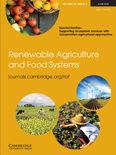
RENEWABLE AGRICULTURE AND FOOD SYSTEMS
Advancing sustainable practices in agriculture and food.RENEWABLE AGRICULTURE AND FOOD SYSTEMS, published by Cambridge University Press, is a leading open-access journal dedicated to the advancement of sustainability in agricultural practices and food systems. With an ISSN of 1742-1705 and an E-ISSN of 1742-1713, this journal spans the interdisciplinary fields of agronomy and food science, achieving a commendable Q2 ranking in both categories for 2023. As it continues to converge through the years from 2004 to 2024, the journal offers a platform for researchers, professionals, and students to disseminate transformative research that addresses the challenges of food security, resource management, and environmental impact. The journal’s significant impact is underscored by its Scopus rankings, situating it in the 77th percentile among agronomy and crop science publications, and the 67th percentile in food science. Since becoming fully open access in 2023, RENEWABLE AGRICULTURE AND FOOD SYSTEMS promotes wider accessibility to vital research findings, fostering collaboration and innovation in the pursuit of sustainable agricultural practices and food systems worldwide.

ENVIRONMENT DEVELOPMENT AND SUSTAINABILITY
Empowering Ideas for Resilient Ecosystems and SocietiesEnvironment, Development and Sustainability is a leading academic journal published by Springer, dedicated to advancing the understanding of the intricate relationships between environmental processes, human development, and sustainable practices. With an ISSN of 1387-585X and an E-ISSN of 1573-2975, this journal provides a platform for high-quality interdisciplinary research that integrates insights from economics, geography, and environmental policy. As of 2023, the journal boasts an impressive impact factor ranking, positioned in the Q2 category for Economics and Econometrics, Q1 for Geography, Planning and Development, and Q2 for Management, Monitoring, Policy and Law. This impressive stature has earned it a significant Scopus ranking, placing it within the top tiers of its field, particularly in Social Sciences and Environmental Science. With a publication timeline extending from 1999 to 2024, the journal serves as a valuable resource for researchers, professionals, and students alike, promoting knowledge exchange and fostering groundbreaking ideas essential for sustainable development. Although it operates under a subscription model, the impact of its articles is profound, making it a pivotal outlet for researchers striving towards sustainability in a rapidly changing world.
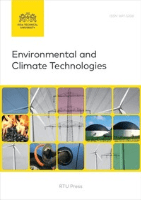
Environmental and Climate Technologies
Bridging Science and Sustainability for Global Impact.Environmental and Climate Technologies is a premier open-access journal dedicated to advancing knowledge in the fields of environmental science and renewable energy. Published by SCIENDO since 2009, this journal plays a crucial role in disseminating innovative research and interdisciplinary studies that address the pressing challenges posed by climate change and sustainable development. With its current positioning in the Q2 quartile for Environmental Science (miscellaneous) and Q3 for Renewable Energy, Sustainability and the Environment, it is recognized for its significant contributions to the academic community, ranking #107 out of 233 in General Environmental Science and #161 out of 270 in Renewable Energy. Hailing from Germany and operating under an open-access policy, Environmental and Climate Technologies ensures that research remains accessible to a global audience, fostering collaboration and discussion among researchers, professionals, and students alike. The journal invites rigorous scientific inquiries and practical solutions that can mitigate the impact of climate-related issues, making it a vital resource for those committed to environmental stewardship and sustainability.

Global Sustainability
Advancing Knowledge for Global ChangeGlobal Sustainability, published by Cambridge University Press, serves as a pivotal platform for interdisciplinary research in the realms of sustainability, management, and environmental policy. Since its establishment as an Open Access journal in 2018, it has empowered researchers, professionals, and students by ensuring that high-quality research is widely accessible. With an impressive impact factor reflected in its Q1 category rankings in both Global and Planetary Change and Management, Monitoring, Policy and Law, this journal is at the forefront of advancing knowledge and strategies crucial for sustainable development. Operating from its headquarters in Cambridge, United Kingdom, this journal not only influences academic discourse but also plays a significant role in shaping public policy and practices towards a more sustainable world. Researchers are encouraged to submit innovative contributions as the journal continues to converge impactful scholarship from 2018 to 2024 and beyond.

Observatorio Medioambiental
Pioneering Innovations in Environmental ManagementObservatorio Medioambiental is a premier journal dedicated to advancing the understanding of environmental science and policy, published by UNIV COMPLUTENSE MADRID, SERVICIO PUBLICACIONES. With a strong commitment to scholarly excellence, this journal serves as a vital platform for researchers, professionals, and students interested in addressing contemporary environmental challenges through interdisciplinary studies. Although currently not listed as an Open Access journal, it maintains high academic standards, ensuring that published research contributes significantly to the field. The journal fosters the dissemination of knowledge regarding ecological conservation, sustainable development, and environmental management practices. By providing a rigorous peer-reviewed environment, Observatorio Medioambiental plays a crucial role in shaping informed and sustainable environmental policies and practices on both local and global scales.
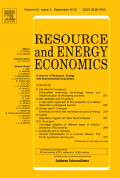
RESOURCE AND ENERGY ECONOMICS
Driving Interdisciplinary Dialogue for Sustainable SolutionsRESOURCE AND ENERGY ECONOMICS is a premier academic journal published by ELSEVIER, specializing in the intricate fields of economics and econometrics with a particular focus on the intersection of resource management and energy policy. Established in 1993, the journal has been a vital platform for scholars and professionals, contributing to significant advancements in the understanding of economic aspects surrounding natural resources and energy systems. With an impressive impact factor and ranking in the top quartile (Q1) of its category, it is recognized for its rigorous peer-reviewed research that informs both academic inquiry and practical applications in the industry. The journal is based in the Netherlands and caters to a global audience, fostering interdisciplinary discussions aimed at addressing pressing environmental and economic challenges. Accessible primarily through institutional subscriptions, RESOURCE AND ENERGY ECONOMICS continues to shape the discourse in its field, making it an essential read for researchers, policymakers, and practitioners striving for innovative solutions in resource and energy economics.